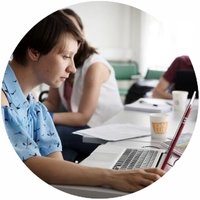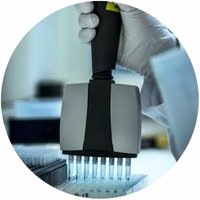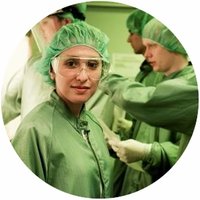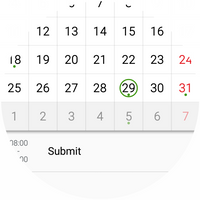Photo: Mikael Risedal
INTERESTED TO LEARN NETWORK-BASED BIOCOMPUTATION?
We are offering training periods of typically 2-8 weeks duration at one of the groups involved in the Bio4Comp project. This includes support for accomodation and travel, supervised, cost free, hands-on training in the laboratories of the groups to learn, for example, how to purify protein motors, run gliding motility assays, use high-resolution optical microscopy, employ nanofabrication for computing networks, perform simulations or learn mathematical approaches. Due to the Covid situation, the timing of the actual training will be agreed between the host and the trainee individually.
Who can apply?
Everyone with a MSc degree (or comparable) from academic and industrial groups who wish to enter the field but lack one or more of the required competences can apply for training periods at one of the project partner’s sites.
Methods included (but not limited to)
- how to purify motor proteins and cytoskeletal filaments
- run in vitro gliding motility assays, where surface-attached motor proteins propel cytoskeletal filaments
- in vitro stepping assays, where single motor proteins move on fixed cytoskeletal filaments
- modification of cytoskeletal filaments with fluorescent dyes, cargo molecules, splitting enzymes
- (single molecule) fluorescence microscopy including automated single molecule localization and tracking
- nanofabrication for computing networks: structuring & patterning (e-beam & UV & imprint lithography), layer deposition (chemical & physical vapor deposition, sputtering), subtractive techniques: reactive ion etching, laser structuring etc
- simulations of biocomputation networks
- formal verification of network algorithms
- mathematical approaches to constructing networks that encode combinatorial problems
Objective
Provide you with the complementary skills required to enter the research field of network-based biocomputation, i.e. after the end of the stay, the trainees should be able to set-up the methods in their institution/laboratory.
Funding for the training periods will be given as part of our efforts to build a structured, interdisciplinary community in network-based biocomputation.
Expertise of the groups offering to host trainees
Lund University, Heiner Linke group
- Network translate new algorithms into physical networks
- Development of architectural elements for computational networks, including programmable gates, FET-based electric detectors for filaments, error proof junctions.
- Development of nano-imprint lithography for fast network replication
TU Dresden, Stefan Diez group
- Network design and error calculation
- Expertise in kinesin-1-microtubule motility systems
- Geometrical optimization of network junctions
- implementation and testing of switchable junctions based on thermo-responsive polymers, testing of electrical filament detection systems
- Multiplication of microtubules
- Filament encoding
- Optimization of motility systems
- Network testing and microfluidics implementation for kinesin-microtubule system
Linnaeus University, Alf Månsson group
- Mathematical modelling of molecular motor and filament systems
- Upscaling efforts with focus on the biological systems, in particular: multiplication of actin filaments, longevity and other optimizations of motor systems e.g. related to surface-protein interactions
- Expertise in actin-myosin motility systems
- Network testing and microfluidics implementation for myosin-actin system
- Single molecule analysis of actin-, and myosin-binding proteins, ligands and substrates
Bar Ilan University, Hillel Kugler group
- Network design to realize new algorithms
- Development of new tools methods and software for modelling and formal verification
Fraunhofer-Gesellschaft zur Förderung der angewandten Forschung e. V., (1) Fraunhofer Institute for Electronic Nano Systems (ENAS), Chemnitz, Germany or (2) Fraunhofer Institute for Silicate Research (ISC), Würzburg, Germany
- Smart Systems Integration and upscaling of the nanofabrication for biocomputation network structures
- Integration of architectural components into biocomputation network structures
- Materials systems (e.g. hybrid polymers) and optical fabrication routes for error-free three-dimensional junctions
More information about the groups expert area in this project, see Partners
HOW TO APPLY
Applications should be submitted by e-mail to info@bio4comp.org.
The application should include
- One-page project descriptions, explaining their research and research environment, which partner they would like to visit, which technique they would like to learn and how this will benefit their work environment afterwards
- CV (max 1 A4 page)2)
- Master and doctoral students only: a short letter of support from their supervisor.
All submitted files should be in pdf format and include your name in the filename.
The e-mail subject must contain “Application for Bio4Comp training period” to make sure they do not get into the spam-folder.
When to apply?
This is an open call. That means you can send in your application at any time until 28 February 2022.
What happens after we receive your application?
All applications will be forwarded to the Bio4Comp Innovation System Committee for evaluation and selection.
All applications will be evaluated according to the following criteria:
- Expected impact for the applicants research environment (50 % weight)
- Excellence of the applicant’s research and future plans (40 % weight)
- Gender balance (10 %)
Each applicant will get feedback one month after the submission date at the latest.
Scoring statistics will only be published if there are a sufficient number of applicants to guarantee anonymity.
The partner hosting a trainee will contact the selected applicant and make individual arrangements about the practical aspects of the training.
This selection of the trainee is final and cannot be contested.
Each Bio4Comp partner has reserved 6000 Euro in their project budget and will accept trainees until the reserved funding of 6000 Euro will be used up.
What can be funded?
Travel costs: three alternatives are possible: (1) the hosting institution books tickets for the trainee. In that case, no reimbursement to the trainee will be required. (2) the trainee buys tickets and the hosting institution will reimburse the costs upon submission of original receipts by bank transfer to an account specified by the trainee (3) the trainee’s home institution buys the tickets. In this case, the home institution can invoice the hosting institution including the ticket receipts as supporting information. For airfare only economy or economy premium can be reimbursed.
Overnight stay: depending on the internal rules of the hosting Bio4Comp partner, three alternatives apply: (1) the Bio4Comp partner can book and pay guest researcher housing for the trainee or (2) the trainee books overnight stay and will get reimbursement for up to 50 Euro per night upon submission of original receipts by bank transfer to an account specified by the trainee or (3) the trainee’s home institution pays for the overnight stay. In this case, the home institution can invoice the hosting institution for up to 50 Euro per night including the receipts as supporting information.
The exact details depend on the internal rules of the hosting institution and have to be agreed upon between he trainee and the hosting institution.
Training material and person-months for the person giving the training will be provided by the host and do not count in this cost category.
Avoiding conflict of interest: persons affiliated to ULUND, TUD, LnU, MolS, BIU or Fraunhofer are excluded from receiving training funds. Also, persons and entities against which restrictive measures are in force (Article 215 TFEU) will be excluded. Each person can only receive financial support once.
The rules laid out in the Annex K of the H2020 Work Programme apply.
1) The rules for eligibility laid out in the Annex K of the H2020 Work Programme apply.
2)including a statement of previously received financial support as a third party in accordance with Article 137 of the Financial Regulation No 966/2012 as mentioned in the Annex K of the H2020 Working Programme.
GDPR compliance: the purpose of the training periods is to build a structured, interdisciplinary community in network-based biocomputation. Your application for a training period does contain personal data (name, contact, professional qualification and interest). As coordinator of the Bio4Comp project, the Lund University collects these data for the purpose of processing applications for training periods and will retain names and contact information to inform you about future biocomputation community events.
More information about processing of personal data at Lund University
We hope that you remain interested in biocomputation, training periods and the biocomputation community. By submitting you consent to your personal data being processed and that you have been informed about the purpose of the collection of your data. You can withdraw your consent by contacting us at info@bio4comp.org and request your personal data to be removed.










